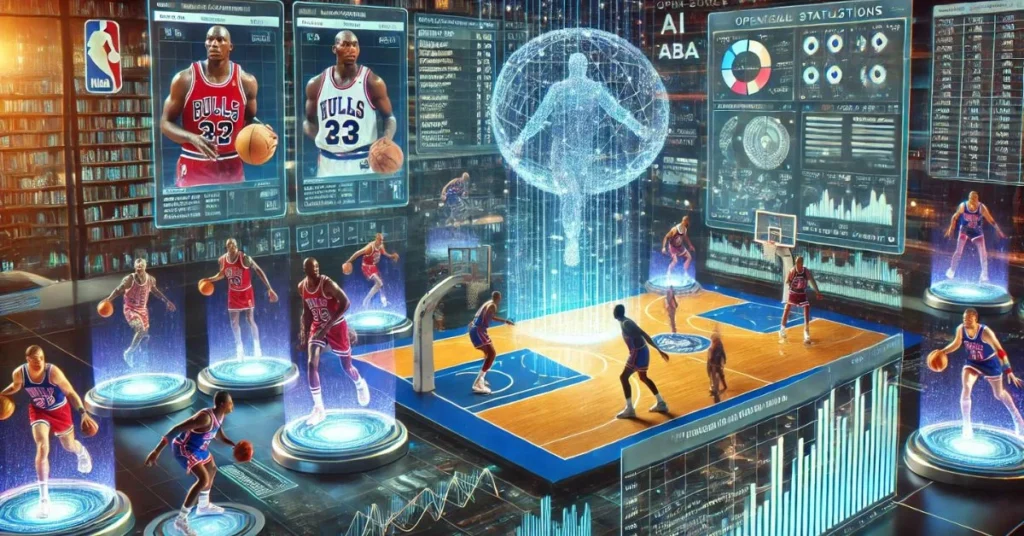Introduction
In today’s digital world, the fusion of sports and technology is creating exciting opportunities to explore beloved games through innovative platforms. When you combine the legacy of basketball legends with the power of open-source development on GitHub, you get a fascinating ecosystem where passion for the sport meets cutting-edge technology. In this article, we will explore everything there is to know about Basketball Legends GitHub—a vibrant community where data, code, and sports history converge.
Overview of Basketball Legends
Basketball is not merely a game—it’s a cultural phenomenon, replete with iconic figures whose names resonate across generations. Legends like Michael Jordan, LeBron James, Kobe Bryant, and many others have shaped the sport with their extraordinary skills and unforgettable moments. Their careers inspire countless fans and have transcended the boundaries of the basketball court.
The term “Basketball Legends” symbolizes more than just players; it represents a rich history, memorable games, and a legacy that continues to influence modern sports analytics, media, and digital storytelling.
What is GitHub?
GitHub is a web-based platform designed for version control and collaborative software development. It is widely used by developers around the world to host, manage, and share code repositories. GitHub fosters a community of innovation, where enthusiasts and professionals alike can contribute to projects, share ideas, and build tools that can be used by anyone—regardless of their background or expertise.
The Intersection of Basketball Legends and GitHub
The concept of Basketball Legends GitHub might sound unconventional at first. However, it represents a unique blend of sports history and technological advancement, where fans and developers come together to build repositories, analyze data, and celebrate the legacies of basketball’s greatest players.
The Concept Behind Basketball Legends GitHub
At its core, Basketball Legends GitHub is about curating and developing projects that focus on the rich data and stories of basketball icons. This might include detailed statistical analyses, visualizations of historical performance, interactive timelines, and even machine learning projects that predict game outcomes or player performances based on historical trends.
Developers and enthusiasts use GitHub as a central repository where they can:
- Store and manage datasets about player statistics, game records, and biographical details.
- Develop applications that simulate historical games or recreate legendary moments.
- Collaborate on projects that aim to preserve the history of basketball through digital means.
Importance in the Developer and Sports Community
The integration of sports and open-source development is significant for several reasons:
- Collaboration: GitHub provides a platform where fans, data scientists, and developers can collaborate on projects that celebrate the sport.
- Education: The repositories offer a wealth of resources for those interested in learning about data analytics, programming, and the application of technology in sports.
- Innovation: Open-source projects encourage innovation, leading to new insights into game strategies, player performance, and historical trends.
- Community Building: By engaging with both the sports and tech communities, Basketball Legends GitHub creates a vibrant ecosystem where passion meets progress.
History and Background
Understanding the roots of both basketball legends and GitHub helps us appreciate how these two seemingly disparate elements have come together to form a dynamic online community.
The Evolution of Basketball Legends
Basketball has evolved significantly since its inception. From the early days of the sport to the modern era of high-flying dunks and three-point barrages, legends have always been at the center of this transformation. Over the decades, these players have not only redefined the game with their skills but also become symbols of perseverance, excellence, and innovation.
Key historical moments include:
- The rise of the NBA and its global influence.
- The emergence of superstars who redefined the sport with their unique styles and achievements.
- The cultural impact of basketball, as seen through media, films, and community initiatives.
The Evolution of GitHub as a Platform
GitHub, launched in 2008, has transformed the way developers work together on projects. Initially built for code collaboration, it has grown into a vast repository of projects ranging from small scripts to large-scale enterprise solutions. GitHub’s impact is far-reaching:
- It has democratized software development by making code accessible to anyone.
- It has spurred a culture of open collaboration, where developers learn from one another.
- It has become a critical tool for sharing knowledge and fostering innovation in various fields, including sports analytics.
Key Projects and Repositories
Basketball Legends GitHub is home to a variety of projects that showcase the intersection of sports history and modern technology. These repositories serve as digital archives, interactive applications, and educational tools.
Notable Basketball Legends Repositories
Several repositories have stood out for their innovative approach to merging basketball history with data science and coding:
- Statistical Analysis Projects: These repositories analyze player performance over the decades, providing insights into trends and benchmarks.
- Interactive Timelines: Some projects create interactive timelines that detail key moments in basketball history, offering users an engaging way to explore legendary careers.
- Game Simulation Engines: There are repositories that use historical data to simulate classic games, allowing users to relive iconic moments through code.
- Visualization Tools: Repositories dedicated to data visualization help in creating dynamic charts and graphs that illustrate player statistics, game outcomes, and other critical metrics.
Features and Technologies Used
Projects hosted under Basketball Legends GitHub often employ a diverse array of technologies:
- Programming Languages: Python, JavaScript, and R are commonly used for data analysis and visualization.
- Frameworks and Libraries: Tools such as TensorFlow for machine learning, D3.js for interactive graphics, and Pandas for data manipulation are frequently integrated.
- APIs and Data Sources: Many projects leverage sports APIs and publicly available datasets to enrich their repositories with real-world data.
- Collaborative Tools: Git version control, continuous integration tools, and code review practices ensure that projects maintain high standards of quality and collaboration.
How Basketball Legends GitHub is Impacting the Community
The integration of basketball legends with GitHub is having a profound impact on both the sports and tech communities. This fusion is fostering an environment of learning, creativity, and collaboration.
Collaboration Between Developers and Fans
One of the most exciting aspects of Basketball Legends GitHub is the way it bridges the gap between passionate fans and skilled developers:
- Shared Passion: Fans contribute their insights, anecdotes, and data about legendary players, enriching the content available on the platform.
- Skill Sharing: Developers share code and best practices, helping others improve their technical skills while working on projects that celebrate their love for basketball.
- Community Projects: Collaborative projects often bring together diverse perspectives, resulting in innovative tools that appeal to both sports enthusiasts and tech professionals.
Educational Value and Data Analysis
For many, Basketball Legends GitHub serves as an educational hub where one can learn about data analytics, coding, and sports history all at once:
- Learning by Doing: Contributors can dive into real-world datasets and see how statistical models are built and applied.
- Case Studies: Detailed analyses of players’ careers and game outcomes provide concrete examples of how data can be used to tell a story.
- Open-Source Education: The open-source nature of these projects means that anyone can study the code, contribute improvements, or even fork the projects to create something new.
Tools and Technologies Involved
Developing and maintaining Basketball Legends projects on GitHub requires an impressive toolkit that spans various domains of technology.
Programming Languages and Frameworks
Several programming languages and frameworks play pivotal roles in these projects:
- Python: Widely used for data manipulation, analysis, and machine learning, Python is often the backbone of statistical analysis projects.
- JavaScript: Essential for creating interactive web applications and visualizations, JavaScript brings data to life in a dynamic format.
- R: Another favorite for data science, R is used in some projects for its powerful statistical computing capabilities.
- Frameworks: Libraries like Pandas, NumPy, and Matplotlib in Python, along with JavaScript frameworks such as React and D3.js, provide robust solutions for handling and presenting data.
Open-Source Contribution Culture
The open-source ethos that underpins GitHub is central to the success of Basketball Legends projects:
- Transparency: Open-source projects promote transparency by allowing anyone to review and contribute to the code.
- Community Standards: Contribution guidelines, code reviews, and issue tracking help maintain a high standard of quality.
- Continuous Improvement: The community-driven nature of these projects means that they are constantly evolving, with new features and improvements added by contributors from around the globe.
Success Stories and Case Studies
Examining specific success stories can provide a clearer picture of the impact that Basketball Legends GitHub has had on both the tech and sports communities.
Popular Repositories and Their Contributions
Several repositories have gained attention for their innovative approaches:
- Legendary Data Analysis: A repository that compiles historical performance data of basketball legends, offering insights through interactive charts and detailed statistical models.
- Game Simulators: Projects that use machine learning to simulate classic games have garnered praise for their accuracy and engaging user experience.
- Community-Curated Archives: Some repositories function as digital archives, preserving rare data, photos, and stories about basketball legends for future generations.
Stories of Collaboration
Behind every repository lies a story of collaboration and shared passion:
- Developer-Fan Partnerships: Numerous projects have thrived because of the collaboration between seasoned developers and ardent basketball fans who provide unique insights and datasets.
- Educational Workshops: Online workshops and hackathons organized around these projects have helped many aspiring developers learn real-world applications of coding and data analysis.
- Cross-Community Initiatives: Collaborations between sports historians, statisticians, and coders have led to groundbreaking projects that have not only enriched the repositories but also influenced how basketball data is interpreted and presented.
Challenges and Future Prospects
While the fusion of basketball legends and GitHub has opened up exciting opportunities, it is not without its challenges.
Overcoming Technical and Collaborative Barriers
Developing projects that merge sports data with modern technology can be complex:
- Data Quality and Consistency: Gathering accurate historical data can be challenging, and discrepancies in records may require additional validation and cleaning.
- Technical Hurdles: Implementing sophisticated algorithms and machine learning models demands both expertise and constant updates to keep pace with evolving technology.
- Community Coordination: Coordinating contributions from a diverse community of developers and fans requires robust management practices and clear communication channels.
Future Trends in Open-Source Sports Data
The future of Basketball Legends GitHub looks promising, with several trends likely to shape the landscape:
- Enhanced Data Visualization: As technology advances, we can expect even more sophisticated visualization tools that make data more accessible and engaging.
- Integration of AI and Machine Learning: More projects will likely incorporate artificial intelligence to provide deeper insights into player performance and game dynamics.
- Virtual and Augmented Reality Experiences: With the growing popularity of VR and AR, future repositories might explore immersive ways to relive classic basketball moments.
- Global Collaboration: As the community grows, contributions from around the world will lead to a richer and more diverse understanding of basketball history.
- Educational Initiatives: Continued focus on education will ensure that upcoming generations of developers and sports enthusiasts are well-equipped to build upon the legacy of these projects.
Conclusion
Basketball Legends GitHub is a remarkable convergence of two worlds—one where the passion for basketball meets the innovation of open-source development. It serves not only as a repository for historical data and groundbreaking projects but also as a community hub where fans, developers, and sports historians come together. The platform is a testament to what can be achieved when different communities collaborate, innovate, and share their love for the game. From detailed statistical analyses and game simulations to interactive visualizations and collaborative educational efforts, Basketball Legends GitHub is paving the way for a future where sports and technology are intertwined like never before.
This ecosystem continues to grow, overcome challenges, and inspire new projects that celebrate the rich legacy of basketball. Whether you are a seasoned developer, an avid sports fan, or someone curious about the intersection of technology and sports, there is something in Basketball Legends GitHub for you. The journey is as exciting as the game itself—full of innovation, collaboration, and endless possibilities.
FAQs
What exactly is Basketball Legends GitHub?
Basketball Legends GitHub is a collaborative platform where developers and sports enthusiasts contribute projects related to basketball legends, combining historical data with modern technology to analyze, simulate, and celebrate the legacy of iconic players.
How can I get involved in these projects?
You can contribute by forking repositories, sharing your insights, submitting code improvements, or even starting your own project related to basketball history. GitHub’s open-source community welcomes contributions from all skill levels.
What types of projects can I expect to find?
Projects range from data analysis and interactive visualizations to game simulation engines and digital archives that document the careers and impact of basketball legends.
Are there educational resources available on Basketball Legends GitHub
Yes, many repositories include detailed documentation, tutorials, and case studies that help newcomers understand both the technical and historical aspects of the projects.
What are the future prospects for Basketball Legends GitHub?
The future looks bright with ongoing advancements in data visualization, AI integration, and immersive technologies like VR/AR, ensuring that the platform continues to innovate and expand its reach in both the sports and tech communities.






